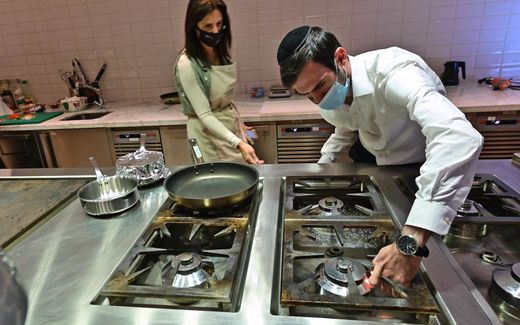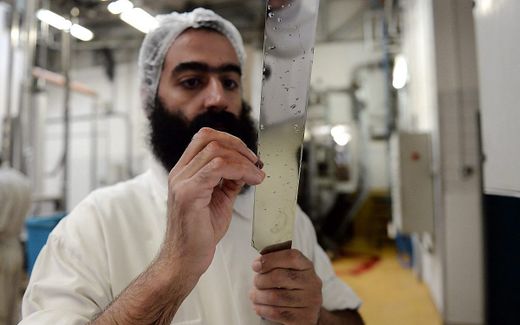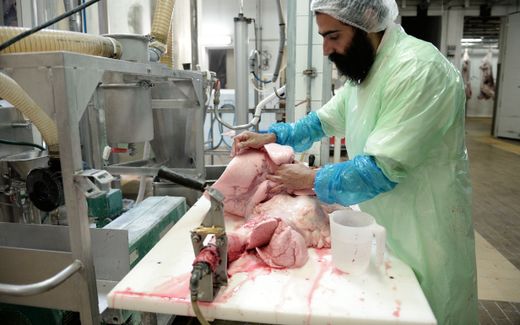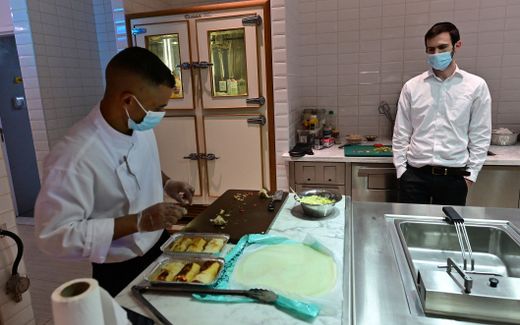How a Jewish prisoner went hungry in a Norwegian cell

According to Mr. Attia, the prison in Stavanger initially solved the lack of kosher food by only serving the Jewish man fruit for one week. Mr. Attia claims he lost seven kilos during the first ten days in Norway. Photo AFP, Jeff Pachoud
Northern Europe
A Jewish prisoner in Norway made headlines after kosher food was refused to him. But help came from an unexpected party.
The Jewish Felix Attia lived on eggs and tuna for half a year. The Israeli man is serving the last part of a six-year prison sentence in Norway for fraud. In 2021, he was extradited by Israel to serve his sentence in Europe. However, one condition of the Israeli court was that the inmate's religious freedom was safeguarded. Norway could guarantee that, it claimed.
But not long after the prisoners were transferred to Scandinavia, the Jewish men made headlines. The Norwegian prison system was not providing kosher food for its Jewish prisoners, despite the government's claims to respect everyone's religious freedoms. Now, nearing the end of his sentence, Mr. Attia is spending his time on a low-security prison island. There, he spoke with the Christian daily Vårt Land.
Mr. Attia says he has had problems with the judicial system since the first day he entered prison. "I explained that I can only eat kosher, but no one had any idea what that was", he says to Vårt Land. According to the Jewish man, the prison in Stavanger initially solved the problem by only serving him fruit for one week. Mr. Attia claims he lost seven kilos during the first ten days in Norway. "I was lying in bed and crying in pain because I was so hungry."

Kosher is a Hebrew term for food that Jews are permitted to eat. These rules are based on the regulations in the books of Moses, Leviticus and Deuteronomy. For example, a Jew can eat meat from animals that have cloven hooves, but pigs are considered "impure". Furthermore, Jewish people are not allowed to mix meat and milk. Therefore, a kosher household has two sets of kitchen utensils.
Only a short time after, Mr. Attia contacted a religious community for help. He explained they sent a kosher list, but Stavanger Prison would not accept food from the list. He had to choose from the food items on the prison's own shopping list. There, he found tinned tuna, crisp bread and fruit. For weeks, Vårt Land writes, he lived on it. "My whole body was completely numb. I had no energy."
Precedent
The issue quickly reached the Norwegian government after various media outlets, including Vårt Land, wrote about it. After the inmate's families offered to pay for kosher foods to be delivered to prison, Justice Minister Enger Mehl refused. She argued that when inmates themselves, or their relatives, pay for catering, this will create a precedent that gives "inmates with resources and good finances advantages that other inmates do not have." Mehl goes even further by stating that the Jewish inmates had been given their own food and ingredients, which they could eat.
But that is simply not true, says Michael Gritzman of the Jewish community in a press release. The Jewish community has offered to deliver kosher food to the prison, but was refused.
Unexpected
For Mr. Attia, help came from an unexpected source. In the air yard of Stavanger Prison, the Jewish man came into contact with a fellow inmate that had a Palestinian background. The two became friends shortly after. The Palestinian, who goes by the pseudonym "Munir", follows the Islamic halal rules and feels compassion for his Jewish counterpart. To Vårt Land, the now free man describes prison management with "a lot of power" which "doesn't think much about religion".

Munir took it upon himself to supply Mr. Attia with food. He worked in the kitchen and hid an unused kettle without the management knowing. In it he boiled four eggs every day and sent to his cell. "Munir" also sent tuna, occasionally an onion or a fruit. This was mainly what Mr. Attia lived on for the first six months in Norway. In the same period, the Jewish man again lost a lot of weight. "One day, I passed out during a training session."
In a document Vårt Land had access to, the prison doctor indicated Mr. Attia as being "fit and well-nourished". The prison further claims that, as far as possible, it "has offered inmates a diet that provides the nutrients the body needs."
Farm
The Jewish man hopes that other inmates will not have to experience the same thing as him. "It is tough to be in prison without proper food. Sometimes I even considered breaking the commandments", he says to Vårt Land. He feels to have received a double punishment and still remembers one thing a prison officer said to him. "By freedom of religion, we mean that no one forces you to be a Christian. We never promised you kosher food."
Today, things are improving for Mr. Attia. Living on the prison island of Bastøy, where inmates farm and run barns, reminds him of life on an Israeli kibbutz. "I also stay slim here because I want to. Not because I don't have enough food." In contrast to Stavanger Prison, Bastøy offers kosher food.
Related Articles








